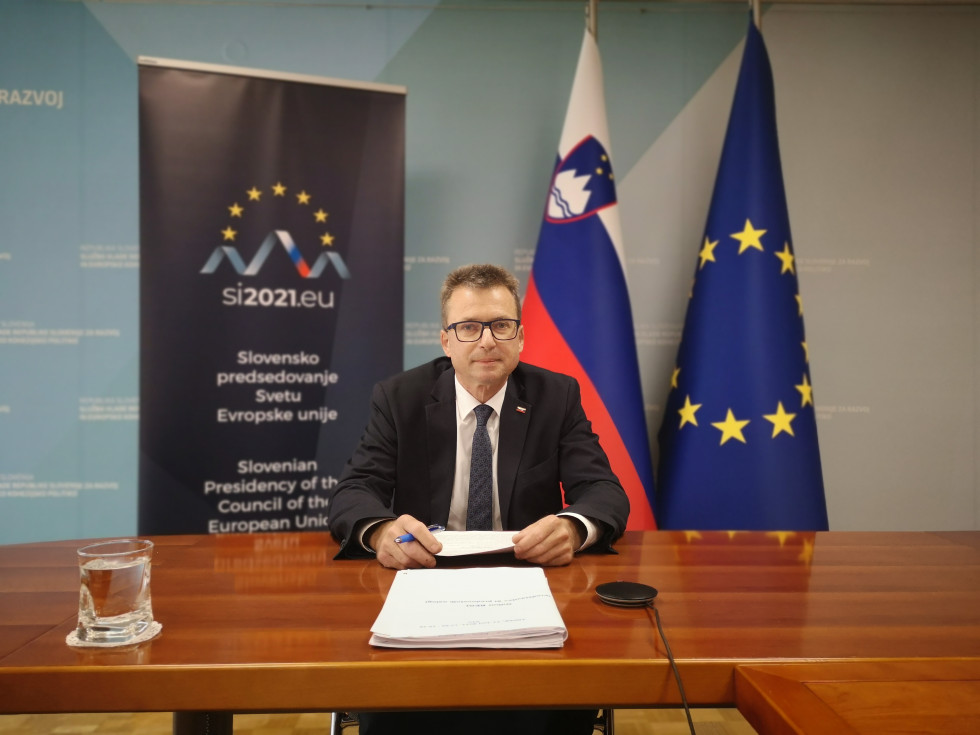Minister Černač in the European Parliament: European Cohesion Policy and its role in the recovery from the Covid-19 pandemic
- Government Office for Development and European Cohesion Policy
In his introductory remarks, the Minister underlined that after the legislative package on Cohesion Policy for the programming period 2021-2027 was adopted in June, it is now up to the Member States to design good partnership agreements and operational programmes. ‘Drafting and implementing the documents should focus on results and achieve added value. I’m confident that all Member States will strive to set up flexible management systems to assist beneficiaries in project implementation and accessing EU funding,’ said the Minister. The Minister said that this would be the subject of the General Affairs Council in the frame of which ministers responsible for Cohesion Policy will meet on 18 November 0221.
The Minister stressed the vital role Cohesion Policy plays in addressing the consequences of the Covid-19 pandemic. ‘With the available Cohesion Policy funding under the period 2014-2020 and the additional funding under the React-EU initiative and the national funding, numerous Member States support investments that help mitigate the consequences of the financial and economic crisis as well as build resilience. Experiences show that Cohesion Policy can adjust and respond to various crises in the spirit of solidarity. Slovenia Presidency will continue with the discussions and activities for building a resilient European Union,’ said the Minister.
The Minister also underlined the role Cohesion Policy plays with regard to development. ‘Cohesion Policy adds significantly to reducing development gaps between regions and improves the quality of life. The money comes from the EU citizens and should be given back to the people. We wish that the people would see the impacts of Cohesion Policy which is why Slovenian Presidency will try to enhance its visibility,’ explained the Minister.
Besides the multiannual financial framework 2021-2027, the Minister also spoke about the EU package on recovery and resilience NextGenerationEU, which gives EU citizens a unique opportunity to build a green, digital, resilient and sustainable European Union. In this respect, the Minister highlighted the effective implementation of the financially most extensive segment, namely the Recovery and Resilience Mechanism. Slovenian Presidency will support the transition to a more resilient society, faster economic growth, and greater prosperity for all. ‘Member States have already prepared their national recovery and resilience plans to be submitted to the European Commission. The plans define the key reforms and investments. One of the priorities of the Slovenian Presidency is the adoption of the plans as soon as possible,’ underlined the Minister.
The Minister underlined the commitment to keeping the Cohesion Policy strong by considering the main principles of solidarity and partnership and the specific characteristics of each Member State and its regions. He concluded his presentation by underlining that Cohesion Policy should ensure equal opportunities for everyone regardless of their municipality, region or country.
Questions by the Members of the European Parliament
In his answers to the questions by the Members of the European Parliament, the Minister said that the Council of the EU, composed of the ministers of economic and financial affairs, today approved 12 national recovery and resilience plans with the following package planned to be approved on 26 July. He stressed that the implementation of the plans should start as soon as possible. In attaining territorial, economic and social cohesion, we should establish synergies and distinguish between the measures to be supported under the Recovery and Resilience Mechanism and the measures supported under Cohesion Policy. Spending should be well planned, adequately combined and economically applied.
‘The need for recovery and future investments varies between the Member States which is why flexibility in Cohesion Policy implementation is crucial,’ said the Minister. The European Commission has prepared a comprehensive proposal for simplifications which were, for the most part, included in the adopted legislative package.
Regarding the allocation of EU funding for rural development, the Minister said that this poses a challenge for European Cohesion Policy, especially in light of the differences between the Member States and the regions. Cohesion Policy should support mechanisms that aim to preserve the settlement level; indeed, proper infrastructure and other conditions bring a higher quality of life in the rural areas than in the densely populated urban areas.
Regarding the rule of law and the related access to EU funding, the Minister responded that only the courts can decide on the rule of law and not political institutions at any level.

